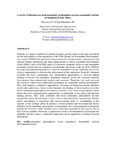| dc.description.abstract | Tourism is a major contributor to global economic growth, hence it has been earmarked for the achievement of the aspirations of the 2030 Agenda for Sustainable Development. As a result, UNWTO has partnered with governments, private partners, international and regional finance institutions and other organizations to realize sustainable Development Goals (SDGs). One of the SDG goals is to promote sustained, inclusive and sustainable economic growth, full and productive employment and decent work for all by 2030 by devising and implementing policies to promote sustainable tourism. Impliedly, inclusivity of local communities is critical to the achievement of the aspirations. Ironically, literature contends that local communities lack participation opportunities in decision-making relating to tourism and experience inadequate financial, social and vocational benefits from projects that commercially exploit their resources. Therefore, this study reviewed the extent to which local communities participate in sustainable tourism development. This study adopted a qualitative approach by reviewing and analyzing existent literature on the topic under study. Based on the literature, the findings of these studies reveal that local communities participation in tourism is coercive, a low form of participation which denies the local communitymore opportunities to participate in key policy and decision making process. This study concludes that local community participation towards sustainable tourism development is more coercive and induced than spontaneous. Besides much participation is associated with socio-economic pillar of sustainability at the expense of the ecologic pillar. In addition, several personal and environmental factors influence local community participation. Consequently, this study proposed an integrated framework of factors which influence local community participation that can be used in East African countries. However, a quantitative study is recommended to investigate the reliability and the extent to which the framework can be applied in the Kenyan tourism destinations | en_US |

